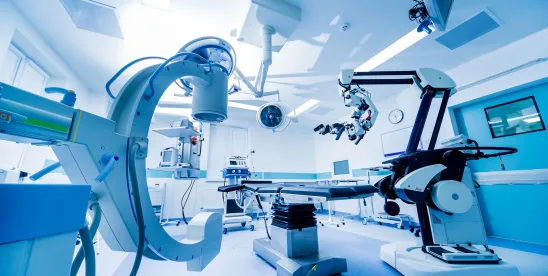On August 6, 2025, the New York Department of Health finalized and made effective significant changes to the Certificate of Need (CON) review process for health facility construction projects. The changes amend § 710.1 of Title 10 of the New York Codes, Rules, and Regulations (NYCRR), streamlining regulatory review and raising cost thresholds to reflect rising construction expenses and evolving methods of health care delivery. The changes stem from New York Governor Kathy Hochul’s 2024 directive to the Department of Health to make changes to the CON process in an effort to lower the administrative barriers to modernization that health care entities face.
Changes to CON Project Cost Thresholds
The revised CON process substantially increases the thresholds for requiring CON review at all, as well as the thresholds for heightened levels of review. To be subject to the CON process, total project costs must now exceed $30 million for general hospitals, and $8 million for all other facilities—up from the previous $15 million for general hospitals, and $6 million for all other facilities.[1] The Department of Health last raised project cost thresholds in 2017.
Under the revised CON process, the project cost threshold for general hospitals to trigger “Full Review” (which includes a recommendation from the Public Health and Health Planning Council) has doubled, now $60 million (or 10% of operating costs, not to exceed $150 million) instead of the previous $30 million.[2] For all other facilities subject to CON review, Full Review is now triggered at $20 million (or 10% of operating costs, not to exceed $30 million)—up from $15 million.[3] For projects involving converting beds to a higher or lower level of care, or changing the number of beds, Full Review is now only required when greater than 10% of a facility’s current beds are involved.[4]
Availability of Administrative and Limited Review
Certain projects are now eligible for administrative or “Limited Review,” including those that do not meet the cost thresholds for Full Review mentioned above. Projects involving mobile clinics and state grant-funded initiatives now qualify for Limited Review.[5] The list of specialized services that automatically trigger Full Review has been amended: notably, lung transplant services have been added, while therapeutic radiology, cardiac catheterization, bone marrow transplantation, burn care, AIDS centers, and epilepsy services have been removed.[6] Certain capital expenditures have also been updated and now only requiring the level of CON review pertinent to the total project cost under Limited Review: these include acquisition of MRI machines and CT scanners.[7]
Certain lower-risk, non-clinical projects are also now exempt from CON review altogether, only requiring notice to the Department of Health. These include any proposal related to health information technology, exam room renovations and other types of general repair and maintenance.[8]
Architectural Self-Certification
The revised process also expands availability for architectural self-certification, a process through which a licensed architect or engineer certifies in writing that the project complies with applicable statutes, codes, and rules of the state.[9] Now, projects up to $30 million (increased from $15 million) may be self-certified, rather than applicants having to submit structural, environmental, and other plans to the state for certification. This change, like others here, is made to “reflect an appropriate balance between the recognition of increased construction costs for large-scale projects and the desire to maintain sufficient oversight while reducing administrative barriers.”[10]
Conclusion
Overall, these revisions modernize New York’s CON framework by balancing oversight with flexibility and reducing the potential for regulatory delays. We will continue to monitor the implementation of these revised requirements.
Footnotes
[1] 10 N.Y.C.R.R. § 710.1(c)(1).
[2] 10 N.Y.C.R.R. § 710.1(c)(3).
[3] Id..
[4] Id.
[5] 10 N.Y.C.R.R. § 710.1(c)(4),(5).
[6] 10 N.Y.C.R.R. § 710.1(c)(3).
[7] 10 N.Y.C.R.R. § 710.1(c)(5).
[8] 10 N.Y.C.R.R. § 710.1(c)(4), (6).
[9] 10 N.Y.C.R.R. § 710.1(c)(2)(v).
[10] 2/26/25 N.Y. St. Reg. HLT-08-25-00002-P.
This post was co-authored with Ivy Miller, legal intern at Robinson+Cole. Ivy is admitted to practice in Massachusetts.



 />i
/>i
